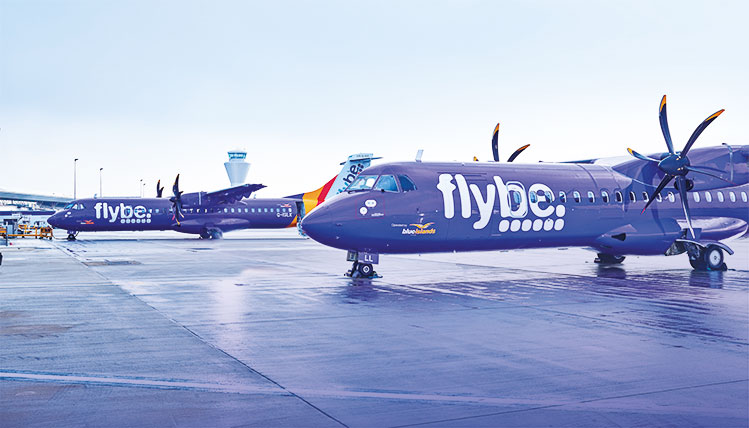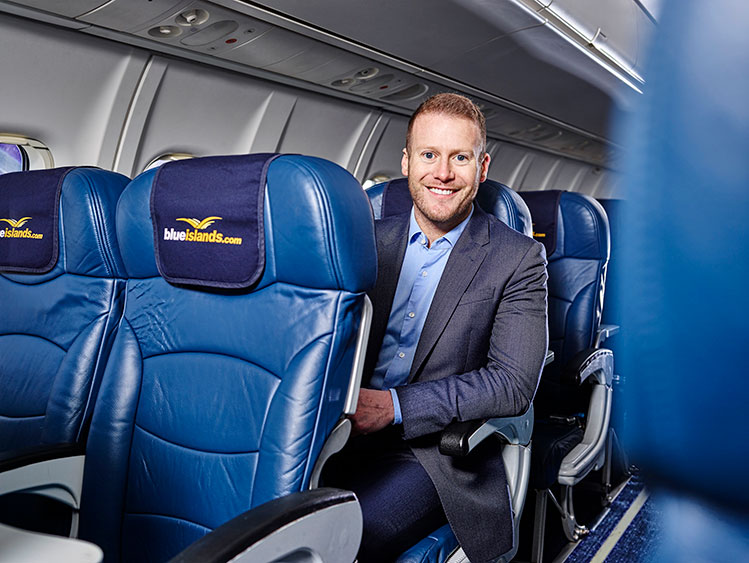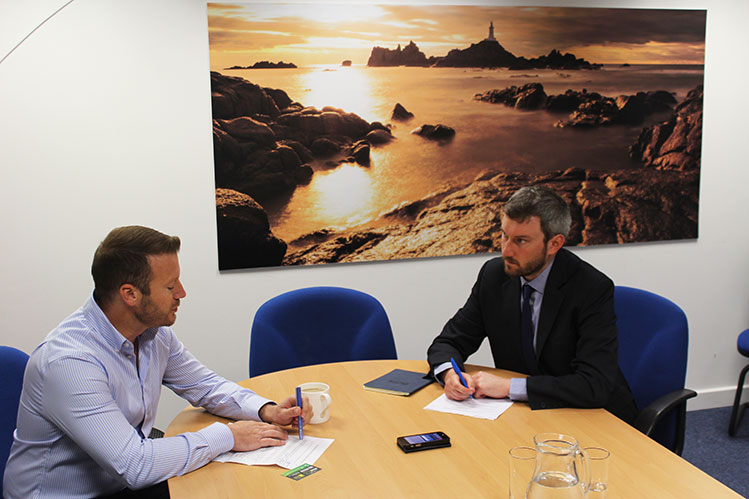
Nick Preston talks to Rob Veron, CEO of UK independent regional operator Blue Islands, which became a Flybe franchise partner in 2016.
Blue Islands is one of only two scheduled airlines based in the Channel Islands. These are British Crown Dependencies, self-governing islands located in the English Channel, but not officially part of the UK. The airline splits its head office functions between Jersey and Guernsey and operates five year-round scheduled routes, plus one seasonal summer connection, and some charter flights. The most significant development in its recent history was the commencement of a franchise agreement with Flybe in June 2016.
Rob Veron has been CEO of Blue Islands since January 2011. In that time, he has overseen the introduction of the Flybe franchise agreement, the phasing-out of smaller Britten-Norman Trislander and Jetstream 31 aircraft, and a migration to an all ATR-based fleet. Nick Preston flew into Guernsey to meet with Veron and discuss the main challenges and opportunities facing his airline and Channel Islands air links, beginning with the benefits of signing up to become a Flybe franchise partner.
“It’s a 10-year agreement, explains Veron. “The rationale behind the franchise agreement is basically that we’re small, independent, Blue Islands, so not many people in the UK will have heard of us. In comparison, Flybe is Europe’s largest regional airline and its marketing bandwidth and capability in terms of attracting inbound passengers from the UK to Jersey and Guernsey is so much more significant than our own, given the size of our business. It’s a combination of that marketing capability, plus the benefits of using Flybe’s sales channels.”
“While you don’t necessarily see the brand Blue Islands on the face of the transaction any more, we are absolutely the operator, we still take all of the commercial risk,” continues Veron. “We pay a franchise fee to Flybe, but fundamentally we choose our routes, we choose our schedule, our frequency, our aircraft type, the whole operation is still very much Blue Islands Ltd, trading as a separate business, we’re just effectively selling through Flybe channels and paying them a percentage fee for doing so. We are entirely independent in terms of pricing. We actively compete with them. It’s 100% our commercial risk and reward. We seek permission from Flybe to deploy their brand assets on a particular route. We have a series of routes which we may operate under the Flybe brand, however that doesn’t prohibit us from operating any services that we may choose to under the Blue Islands brand. The franchise agreement is not entirely exclusive in that sense, but if we didn’t operate under the Flybe brand then we wouldn’t get the benefits in terms of the rationale for going into the franchise in the first place.”

Rob Veron has been the CEO at Blue Islands since 2011, having initially joined the airline in 2004. During his time at the helm, Veron has overseen a complete fleet transition and the signing of a franchise agreement with Flybe.
The challenge of open skies
One recent development that could provide a new sort of challenge for the Blue Islands operation is the decision by the Guernsey authorities to introduce an open skies policy for flights between that Island and the UK. This sort of arrangement already exists in the larger market of Jersey.
“Guernsey’s open skies arrangement officially commenced on 3 September,” says Veron. “Previously, any operator, be it cargo or passenger, needed to apply for a route license from the Guernsey Transport Licensing Authority (TLA) to operate a service between Guernsey and the UK or another Channel Island. This application would consider the existing market and, based on the proposal from the new operator, consider if the new entrant would affect the incumbent position, either directly or indirectly, by cannibalising the market from another route. If a route license was granted it could specify a minimum service provision, such as the aircraft capacity together with frequency of flights per day, week and year, which if not met could see the license revoked.
“Since it has a population of just 62,000, Guernsey is a sub-scale market, that as an island relies on secure air transport links for business, tourism, leisure, medical and sporting requirements. Route licensing was designed to ensure continual year-round services with enough capacity to both safeguard lifeline services for Islanders and support Guernsey’s tourism industry. It also provided operators with some limited protection against the possible arrival of predatory summer services by other airlines. Blue Islands has previously warned of the risk to the year-round viability of existing high-frequency services that Islanders rely on, from potential seasonal cherry-picking by new entrants operating only during the peak summer period.
“Since we will no longer be required to operate a fixed number of flights over a given period, Blue Islands will naturally review the viability of selected off-peak winter flights on certain days which may have previously operated on a loss-making basis,” adds Veron. “Weaker performing rotations could be removed to optimise the schedule according to demand flows, which is a common industry practice. We remain committed to serving Channel Islands communities by offering lifeline air links at reasonable fares. Blue Islands will monitor the outcome of open skies to see if it results in any new operators entering the market and will actively compete on routes which remain commercially viable and where there is a need for Islanders.”
The open skies arrangement will cover all UK and Channel Island links from Guernsey, except for services to Alderney and Gatwick which remain protected under route licenses for the time being. “The Gatwick link is an Aurigny monopoly,” says Veron. “It’s the largest route from the Island, the most likely to sustain a good level of competition and to deliver the benefits that competition would typically deliver, in a market that could sustain it, and it is being safeguarded. As an environment in terms of doing business and providing air services, Guernsey is a real challenge.”

Nick Preston flew into Guernsey to meet Blue Islands CEO Rob Veron. The pair discussed the challenges and opportunities facing a small independent regional carrier, and the unique nature of the Channel Islands market it serves.
Sustainable growth opportunities
Despite the challenges that lie ahead, Veron believes there is scope for future growth. “This summer we’re operating from Guernsey to Jersey, Southampton and Cardiff, and from Jersey to Southampton, Bristol and London City. We’re also doing some series charters to Zurich and Rotterdam, and we’re doing some ad-hoc ACMI work. Yes, we are looking at some other routes and we see potential for some small filler opportunities, including inbound leisure routes and some additional London capacity. There might potentially be some new European routes too. We’re just at the commercial conversation stage, so it’s something I can’t really expand on just yet. We are looking at route opportunities, but they’re not major markets as far as the Channel Islands go, they’re just what we think could be neat additions in terms of schedule optimisation, for routes where there could be some discrete demand.
“Blue Islands is a short-haul, high frequency regional turboprop operator. That’s what we do, that’s what we believe we do well. Over the last five years we’ve increased the size of our business by 75%, with annual passenger numbers up from 210,000 to 365,000, and we’re continuing to grow. It’s these small pieces of considered route development that keep us on our path. Small, considered, sustainable growth is the key for us.”







